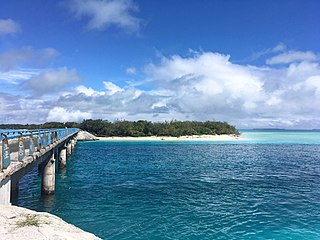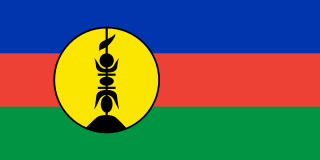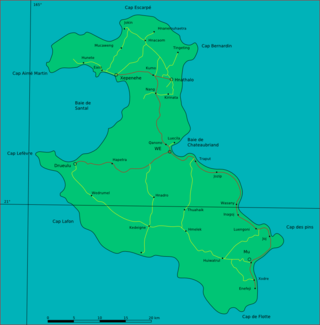
New Caledonia is a group of islands in the southwest Pacific Ocean, 220 km (140 mi) southwest of Vanuatu and 1,210 km (750 mi) east of Australia. Located 16,100 km (10,000 mi) from Metropolitan France, it forms a sui generis collectivity of the French Republic, a legal status unique in overseas France and enshrined in a dedicated chapter of the French Constitution.

New Caledonia is a French sui generis collectivity with a system of government based on parliamentarism and representative democracy. The President of the Government is the head of government, and there is a multi-party system, with Executive power being exercised by the government. Legislative power is vested in both the executive and the Congress of New Caledonia. The judiciary is independent of the executive and the legislature.

Ouvéa or Uvea is a commune in the Loyalty Islands Province of New Caledonia, an overseas territory of France in the Pacific Ocean. The settlement of Fayaoué, on Ouvéa Island, is the administrative centre of the commune.
The thirty New Caledonian languages also known as Kanak languages form a branch of the Southern Oceanic languages. Their speakers are known as Kanaks. One language is extinct, one is critically endangered, four are severely endangered, five are endangered, and another five are vulnerable to extinction.

The Kanak and Socialist National Liberation Front is a pro-independence alliance of political parties in New Caledonia. It was founded in 1984 at a congress of various political parties. Its supporters are mostly from the Kanak indigenous population but also include supporters from other ethnic communities.

Lifou is a commune of France in the Loyalty Islands Province of New Caledonia, Pacific Ocean.

Lifou Island, historically spelt Lifu or Lefu in English, and known as Drehu in the local language, is the largest, most populous and most important island of the Loyalty Islands, in the archipelago of New Caledonia, an overseas territory of France in the Pacific Ocean. With a total area of 1,207 km2 (466 sq mi), Lifou is located east of Australia at 20.9°S 167.2°E.
The Nouméa Accord of 1998 is a promise by the French Republic to grant increased political power to New Caledonia and its indigenous population, the Kanaks, over a twenty-year transition period. It was signed 5 May 1998 by Lionel Jospin, and approved in a referendum in New Caledonia on 8 November, with 72% voting in favour. Under the accord, three more referendum votes, on whether to remain a special collectivity of France or become an independent state, have been held.
Drehu is an Austronesian language mostly spoken on Lifou Island, Loyalty Islands, New Caledonia. It has about 12,000 fluent speakers and the status of a French regional language. This status means that pupils can take it as an optional topic for the baccalauréat in New Caledonia itself or on the French mainland. It has been also taught at the Institut national des langues et civilisations orientales (INALCO) in Paris since 1973 and at the University of New Caledonia since 2000. Like other Kanak languages, Drehu is regulated by the Académie des langues kanak, founded in 2007.

Tiga Island, also called Tokanod, is a small island in the South Pacific Ocean. Tiga lies 35 km (22 mi) from Lifou Island, and 24.5 km (15.2 mi) from Maré Island in the Loyalty Islands. The Loyalty Islands are part of the greater archipelago of New Caledonia.

Maré Island or Nengone is the second-largest of the Loyalty Islands, in the archipelago of New Caledonia, an overseas territory of France in the Pacific Ocean. The island is part of the commune (municipality) of Maré, in the Loyalty Islands Province of New Caledonia.
Mouli Island is one of the Loyalty Islands, in the archipelago of New Caledonia, an overseas territory of France in the Pacific Ocean. The island is part of the commune (municipality) of Ouvéa, in the Loyalty Islands Province of New Caledonia.
Faiava Island is one of the Loyalty Islands, in the archipelago of New Caledonia, an overseas territory of France in the Pacific Ocean. The island is part of the commune (municipality) of Ouvéa, in the Loyalty Islands Province of New Caledonia.
Gondwana-1 is a submarine communications cable network connecting New Caledonia and Australia brought into service in mid-2008.

In New Caledonia, a sui generis collectivity of France, French is the official and predominant language. The collectivity is also home to about thirty New Caledonian languages, which form a branch of the Southern Oceanic languages. They are spoken mainly by the indigenous Kanaks of the islands.
Evanès Boula is the current chief of Lössi and high chief of Lifou in the Loyalty Islands of New Caledonia. His is one of three Kanak chieftaincies on the island of Lifou, the others being Gaïtcha and Wetr, and was established by the Boula dynasty prior to the arrival of French colonists. The high chieftaincy, which is always held by the chief of Lössi, reigns over 37 tribes on Lifou, as well as all tribes on Ouvéa. Among the tribes over which he rules, his word is law, and his power is absolute.
Jawe is one of the Kanak languages spoken in the northern province of the largest island of New Caledonia named Grande Terre. Jawe speakers are located along the northeast coast of the island, north of Hienghène and south of Pouébo; primarily in the Cascada de Tao region, Tchambouenne, and in the upper valleys of both sides of the centrally dividing mountain range.

The Kanaks are the indigenous Melanesian inhabitants of New Caledonia, an overseas collectivity of France in the southwest Pacific. Kanak peoples traditionally speak diverse Austronesian languages that belong to the New Caledonian branch of Oceanic. According to the 2019 census, the Kanaks make up 41.2% of New Caledonia's total population — corresponding to around 112,000 people. The other populations are the Caldoche, who are European born in New Caledonia; the Zoreille, who were born in metropolitan France and live in New Caledonia, in addition to about 10% that are non-Kanak Polynesians and 10% that are mixed race.
Marie-Claude Tjibaou is a former medal-winning athlete, Kanak activist and politician, and widow of the independence movement leader in New Caledonia, Jean-Marie Tjibaou.










